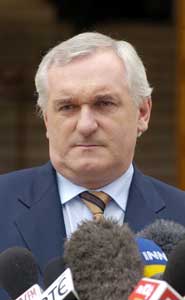2 September 2004 Edition
Politics without convictions - Election SSIA and tax cut bonanza on the way
BY ROBBIE SMYTH

Taoiseach Bertie Ahern
Holding onto power is a difficult thing, especially after spending 15 of the last 18 years in government. Last week, 20 fretful Fianna Fáil strategists met in one of Dublin's most exclusive hotels to plan new strategies for the party. The net result of their deliberations is that Fianna Fáil is in danger of developing a serious neurotic psychosis as it confuses its political reality of being a party in semi-continuous power with the desire to be part of a cutting dynamic opposition.
The party is planning new year pre-election tax cuts, plus amassing voter plaudits as Special Savings Investment Accounts (SSIAs) are harvested in 2006 and 2007, as well as growing state coffers. This all points to a party ready for another pre-election spending splurge and another term in office.
The same political party is also having a period of crisis and self doubt over its "image" and voter perceptions, after what media pundits continually remind us and them, was their worst electoral performance since 1927.
The group meeting, made up of party TDs, some Ministers, leader Bertie Ahern and other officials, including General Secretary Seán Dorgan, was co-ordinated by a "professional facilitator" (Sunday Times) or a "crisis management expert" (Irish Examiner).
Fianna Fáil, it seems, is worried that its image has gone "stale" and that Sinn Féin's electoral successes are undermining the Fianna Fáil political core.
The proposals resulting from the meeting included hiring more full-time organisers and Ministers doing area meetings to bolster the party. Bertie Ahern reportedly told the group that he could have left for Europe but was staying to "face up to the challenge ahead".
Two vital issues, though, were left out from the Fianna Fáil deliberations, those of their own political convictions and facing up to the consequences of their own policies.
Fianna Fáil want to return to being a grassroots community-based party, or so it seems from the media reports seeping out of the party since the June local and EU elections. Why? Surely a party in political power could represent the interests of the grassroots with ease?
This is the gaping flaw in the Fianna Fáil perception of their political image. They want the public to identify with the party and support it, but they don't seem to realise that this is increasingly difficult as an ever growing part of the electorate see the party as not representing their interests or their communities.
Cutting back
The party is suffering from a lack of political convictions. For example, if Fianna Fáil really believes in community politics, why are they cutting back on CE schemes, or its pre-Leinster House election commitments on primary school refurbishment? Why are they centralising political power, such as the right of local authorities to plan and implement their own waste management strategies?
Why have Fianna Fáil neglected rural development in the west and northwest? Why have they not created a regional based job creation strategy? All of these questions have one simple answer: Fianna Fáil today holds none of the political convictions that would mean supporting these strategies.
The party's real core strategy is to get into and hold onto political power. Any hand-wringing over the community now is based on this agenda of staying in power.
Bad policy decisions
The real reason Fianna Fáil lost votes is their bad policy decisions that neglected significant amounts of voters. This is absent from their post-election thinking. It's your policies, stupid!
However, things are not that bleak for Bertie. He is the leader of one of Europe's most successful political parties. He is the most long lived political leader in Europe today and has more ministerial experience than most leaders in the rest of the EU. His party has a percentage vote share unmatched across most of the EU.
It is interesting that in the same week as Fianna Fáil were having their 'think-in', other parts of the party in government were planning tax cuts and other new selective spending strategies that they hope will dazzle the voters in 2006.
The real danger for them and the unmentioned issue in their weekend revamp is that ever more voters can see past the gloss and no amount of restructuring can overcome the lack of real convictions that pervades the larger coalition partner.
One wonders how the new Fianna Fáil image will be presented. We will have to wait until after the cabinet shuffle to ask again and again — what do you really stand for?
